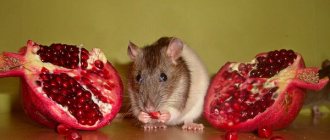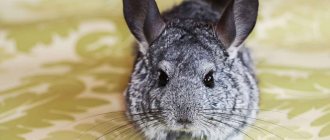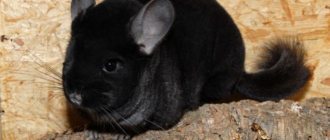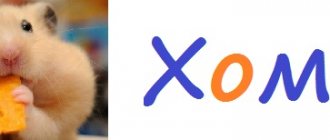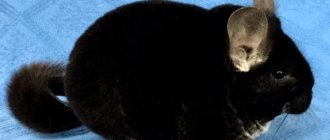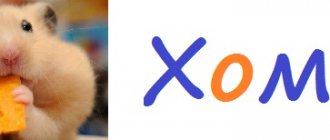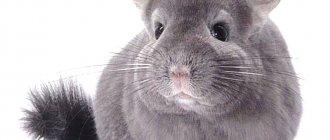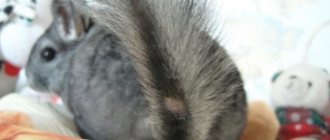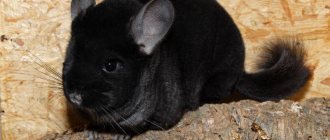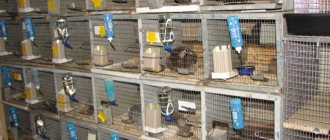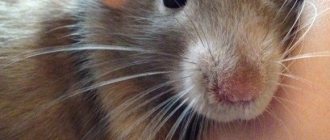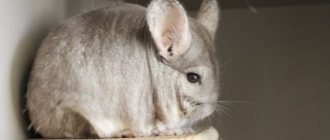The benefits of succulent food
In their natural habitat - the mountainous regions of South America, chinchillas eat rather poorly. The basis of their diet is plant food - grass, twigs, shrubs, seeds, mosses and lichens. Therefore, succulent food is an unusual dish for high-mountain rodents. However, fruits, vegetables and berries must be included in the chinchilla’s menu, as they have the following beneficial properties:
- Strengthen immunity . Fruits, vegetables and berries contain a large amount of vitamins. Therefore, their regular use significantly increases the pet’s body’s resistance to disease. It is especially useful to feed your chinchilla succulent food in the autumn-winter period. To prevent the animal from catching a cold, you need to give it more foods containing vitamin C - tangerine, tomato, rose hips, raspberries.
- They are a source of moisture . In nature, chinchillas do not drink. Fluffies use morning grass with dew or succulent succulents as sources of water. At home, your pet can drink from the shelf. But it is much more common for a chinchilla to receive water while eating juicy fruits and vegetables.
- Prevents the development of tumors . Chinchillas, like any other animals, are not protected from the development of tumors. Juicy food contains a large amount of antioxidants that prevent the division of cancer cells. The most beneficial substances are found in berries.
- Improves the functioning of the gastrointestinal tract . Fruits, vegetables and berries contain a lot of fiber, which activates intestinal motility and promotes gentle cleansing. This is very important because chinchillas are naturally prone to constipation.
It is worth noting that before reaching the age of 6-7 months, it is better to give young animals slightly dried fruits, vegetables and berries. And adult animals with a fully formed digestive system are allowed to offer fresh succulent food.
Vitamin supplements to complement your diet
Additional vitamins are given to animals with a lack of nutrition, young animals, females during pregnancy and lactation, as well as in case of illness. They come in various forms, but the easiest way is to add liquid vitamin supplements to water. Some manufacturers produce food enriched with vitamins.
Owners sometimes add 2-5 g of dry yeast to the animals as a source of protein and vitamin B. Also, mineral salt stones of various types are placed or suspended in the cage: the animals grind their teeth on them and replenish the balance of minerals in the body.
Attention! If during illness the animal refuses to eat, it should be fed from a syringe. To do this, use high-calorie pastes (Nutrical, Enervite) and crushed food mixed with baby food.
What fruits can you give?
Offering fruit to your fluffy should be done with caution. The fact is that on market counters and on store shelves there are mainly products stuffed with nitrates and other harmful compounds that accelerate ripening. Therefore, it is better to give your chinchilla only seasonal fruits, and even better, those grown in your own garden. Fluffy will love:
- apple;
- banana;
- pear;
- peach;
- plum;
- mango;
- apricot;
- melon;
- avocado.
Before serving, the fruit should be finely chopped. And most importantly, remove the seeds, which are poisonous to chinchillas. It is worth keeping in mind that fruits contain a lot of carbohydrates, so you should not overfeed your chinchilla with them. Otherwise, the animal will quickly gain excess weight and develop problems with the heart and blood vessels.
Many novice chinchilla breeders are interested in whether chinchillas are allowed to give dried fruits. Fluffies can be fed similar treats, but not more than 1-2 times a week, since they contain a lot of sugar. Chinchillas are allowed almost everything from dried fruits - dried apricots, raisins, dates, prunes, figs.
Nutritional value of an apple and how does it help in a chinchilla's diet?
When considering whether a chinchilla should eat apples, it is important to consider the nutritional value of the fruit to decide whether it helps their diet or may harm them.
Here is the nutritional value of an apple:
- Energy - 52 kcal
- Water-85.56 g
- Proteins - 0.26 g
- Carbohydrates - 13.81 g (10.39 sugars)
- Dietary fiber - 2.4 g
- Fats - 0.17 g
- B vitamins - B1, B2, B3, B5, B6, B9,
- Other vitamins – vitamin C, vitamin E and vitamin K
- Minerals - calcium, iron, magnesium, manganese, phosphorus, potassium, sodium and zinc.
The fact that apples contain high amounts of natural sugars, dietary fiber and vitamin C is the reason why they are a healthy snack. However, it is a sour fruit and so you should not feed them too many apples.
Allowed vegetables
Chinchillas have a very sensitive digestive system. Therefore, before offering your furry a treat, you need to thoroughly wash and chop it. Chinchillas can be offered the following types of vegetables:
- carrot;
- broccoli;
- zucchini;
- pumpkin;
- celery;
- cucumber;
- bell pepper;
- tomatoes;
- Jerusalem artichoke.
It is worth noting that vegetables cannot be given to a chinchilla in unlimited quantities. For an adult, a serving of 5-6 g per day will be enough. You also need to ensure that the vegetables offered to the chinchilla are fully ripe. Otherwise, the animal may not only have an upset stomach, but also serious poisoning.
Also, most chinchilla breeders give their pets dill. This is allowed, just don’t overdo it with fragrant weed. The fact is that dill has a powerful diuretic effect. Therefore, after feeding, it is necessary to ensure that the chinchilla receives a sufficient amount of water. In addition, dill is an excellent remedy for bloating and flatulence.
A good option when you don’t have time to dry it yourself. Chinchilla photos
I envy those who have the time and opportunity to dry treats for their chinchillas on their own. But such lucky ones, alas, are few. Modernity interprets its own rules and there is not enough time for everything. Ready-made dried treats are our salvation.
Little One "Dried Carrot"
Price: 85₽ | Weight: 200g Sample: 1 pack
Manufacturing company: Little One belongs to the Mealberry company, which produces various types of pet products. Specifically Little One - food, specialized diets, treat toys, care products for ornamental animals. Production in St. Petersburg.
Description: Carrots are high in carotene, dietary fiber, potassium, iron, phosphorus, vitamin C and folic acid.
The treat is exclusively an additional food for animals and cannot replace the main diet.
A great addition from the manufacturer. After all, there are times when the owner goes overboard with such delicacies, believing that they can be used to make up an entire diet. And this is absolutely impossible to do.
Ingredients: dried carrots. Composition analysis: Proteins 8.3% | Fat 1.7% | Fiber 30.8% | Ash 6.9%.
The delicacy does not need a large amount of protein, low fat, high fiber. A healthy product, but remember that carrots are sweet and you shouldn’t overdo it. In dried form, sugars have the largest share in carrots - up to 56%.
Chinchillas are similar to diabetic people; they do not digest sugar well and it is often dangerous to give such treats. It is better to limit yourself to no more than 2-3 pieces per week.
Texture: Firm, small carrot pieces. It will be convenient for the chinchilla to hold such pieces in his paws and they are great for portioned treats. The drying quality is excellent. There was no dust in the packaging.
Rumors: there is an opinion that carrots are tinted and that is why they look so bright and juicy. This point can be checked very simply. I wet the carrot and saw how it would behave in this situation. The delicacy softened perfectly, became pliable and did not lose any color.
I can say with confidence that LO carrots do not contain dye or other additives. The carrots are clean, innocent and perfectly dried, as if they were made by hand. There was no dust or dirt in the packaging and the pieces themselves were very clean.
Packaging: convenient plastic container with a tight lid. The plastic is durable, transparent, allows you to monitor the level of contents and consider possible storage problems. Once the product is finished, you can reuse the jar for something else. Weight: 200g Storage: in a dry, cool place.
Availability: the company's products are perhaps the most affordable on the Russian market. You will not encounter any problems with the supply of this delicacy. Price: from 85₽
Pet's reaction: my chinchilla really loves carrots. Tony loves this delicacy even more than dried raspberries.
What berries does a chinchilla eat?
Berries are considered one of the most powerful antioxidants. Therefore, including them in a chinchilla’s diet is not only possible, but also necessary. Adult chinchillas can be given fresh. And for the younger generation - in dried form. In order not to make a mistake and not feed your fluffy with unhealthy food, you can use a summary list of berries allowed for feeding a chinchilla:
- raspberries;
- hawthorn;
- sea buckthorn;
- blackberry;
- strawberry;
- strawberries;
- elder;
- all types of currants;
- hawthorn;
- irga;
- viburnum;
- cranberry.
Just don’t try to pamper your fluffy by feeding him delicious berries. If left unchecked, your chinchilla may eat very large amounts of sweet treats. The optimal dose for an adult pet is 1-2 berries per day. It is advisable that they be grown on their own plot of land.
It is also necessary to take into account that berries, especially those with small seeds, can cause quite serious allergies in a chinchilla. Therefore, it is worth introducing them into the diet gradually. First, give the fluffy 1 berry and wait 2-3 days. If no side effects occur, you can increase the frequency of feeding.
If, after eating new treats, your chinchilla constantly itches and behaves restlessly, you should immediately consult a veterinarian. Most likely, the fluffy has an allergy.
A little about harmful things
Under no circumstances should you feed your chinchilla the following foods:
- meat;
- roasted grains;
- baking;
- starch - noodles, pasta, potatoes;
- fast food;
- mushrooms;
- eggs;
- confectionery, sweets, ice cream, sweets;
- fermented milk products;
- salad, cabbage.
It is better to please pregnant females with treats more often. This will contribute to excellent health, healthy children and tasty milk. Ideal additions to the main food and fresh herbs for them would be calendula, almonds, flax seeds, buckwheat, and dandelion. They not only help cope with problems during pregnancy, but also help restore the body after and give more benefits to milk.
Maintain the amount of tasty and healthy additives, keep in mind that today, for example, you can give an apple, and tomorrow rowan, and your animal will become a real long-liver, while receiving a variety of sweets every day.
What fruits, berries and vegetables should you not give?
Every chinchilla owner should know that not all berries, vegetables and fruits are allowed for furry dogs. Representatives of this type of rodent have a very sensitive digestive system, so the slightest deviation from the feeding rules can result in problems with the pet’s health. To avoid such troubles, you can use the table of fruits, vegetables and berries prohibited for chinchillas:
| Fruits | Vegetables | Berries |
| Persimmon | Cabbage | Any poisonous berries (crow's eye, wolf's bast, belladonna, euonymus) |
| Lemon | Beet | |
| Quince | Potato | |
| Feijoa | Radish | |
| Cherry plum | Radish | |
| Ginger | ||
| Daikon | ||
| Hot pepper | ||
| Sorrel |
It is worth noting that berries that should not be given to chinchillas are also dangerous for humans. Therefore, it is unlikely that the fluffy will receive such a treat at home. Most cases of chinchilla poisoning by berries were recorded precisely after the animal escaped from its cage.
Forbidden fruits and vegetables are, of course, not poisonous to rodents. But they can cause noticeable discomfort in terms of digestion. For example, beets have a laxative effect, so after eating them, the animal may experience diarrhea. Cabbage and radishes can cause bloating and flatulence, which can make your chinchilla moderately sore. And fruits that have an astringent effect (persimmon, quince) can simply get stuck in the chinchilla’s throat and cause suffocation.
Therefore, no matter how much you would like to offer your pet a forbidden treat, it is better to refrain. Fluffies rarely get sick, but they are difficult to treat. In addition, in most provincial cities there are no veterinarians specializing in chinchillas at all.
Prohibited Products
Persimmons are prohibited for feeding. This fruit, useful for humans, is rich in iodine, which is contraindicated for animals. In addition to iodine, persimmons contain a lot of sugar and astringents, which will lead to constipation.
It is not recommended to give chinchillas and beets.
The root vegetable is healthy, but has a laxative effect. In rare cases, small pieces of beets can be given for constipation. Any type of cabbage leads to severe gas formation. Chinchillas love to feast on tea rose petals - they taste pleasant and have an attractive aroma. If flowers are grown in your own garden, there is no danger, but it is better not to give store-bought ones. They contain a lot of pesticides and chemicals that can cause serious poisoning.
When preparing tree branches for the winter, it is worth remembering which species are dangerous and unsuitable for feeding. Branches of which trees cannot be harvested:
- Apricot,
- white acacia,
- Beech,
- Ash leaf maple,
- Common buckthorn
- Cedar,
- Chestnut,
- Branches of any citrus species,
- Cypress,
- Elderberries,
- Cherries,
- Cherries,
- Branches of any coniferous species,
- Holly,
- Hydrangeas,
- Juniper,
- Common maple
- Myrta,
- Oleander,
- Plums.
Oak bark and twigs can only be given to animals suffering from diarrhea. In healthy animals they cause severe constipation.
Branches of stone fruit trees (cherry, cherry, plum, and so on) are dangerous because they contain a dangerous cyanide compound, as a result of the breakdown of which hydrocyanic acid is formed in the chinchilla’s body. If you feed an animal with such twigs, you can get not only severe poisoning, but also the rapid death of your pet.
Prohibited products also include any type of honey, as well as store-bought cottage cheese and fermented milk products.
Not all breeders know that chinchillas should not be given leaves, stems and flowers of indoor plants. Most of them are poisonous to the animal and very often cause death.
It is also not recommended to give any food from a person's table. Everything that is normal and familiar, even useful for people, for a chinchilla becomes the cause of digestive problems, allergies, obesity and other serious diseases. The animal will never refuse tasty and aromatic food and can eat a piece of cake, cheese, meat or fish. However, such food is not normal and familiar to the stomach of a furry pet. And the possible consequences are very sad.
General rules for feeding succulent food
Juicy food has many beneficial properties for chinchillas. However, you should not feed your pet uncontrollably. In order for the fluffy to always feel good, when feeding the animal with fruits, vegetables and berries, you need to follow a few simple recommendations:
- To treat your chinchilla, you need to use only high-quality products without mold, rot, or worms.
- If the chinchilla has not eaten the treat within 1-2 hours, it is better to remove the treat from the cage or replace it with a fresh one.
- The total amount of fruits, berries and vegetables in a fluffy's menu should not exceed 10-15 g per day.
- Before serving, the selected crop must be washed well, dried and cut into pieces convenient for the chinchilla.
- If, after eating a treat, your fluffy feels ill, you need to remove the product from the diet and contact a veterinarian.
Every furry owner should know which fruits, vegetables and berries can be given to a chinchilla and which ones cannot. This way, the owner will be able to pamper his pet with delicious treats and protect him from many health problems.
Treats for chinchillas or what they like most
Every owner pampers his chinchilla with treats, because the animal loves them most.
As soon as you give a piece of treat to the chinchilla, she immediately transforms, becomes cheerful and her whole body is in anticipation. The most important thing is not to overfeed your pet with treats, otherwise he may refuse the main food or diseases will begin to develop, because the animal is very fragile in terms of health. Treats for chinchillas play a very important role in taming; without them, it is very difficult to accustom an animal to your hands. At each lesson, the chinchilla is given a small piece of the treat that she likes most if she follows the commands correctly. Treats reinforce correct actions, and the absence of treats is used to punish the chinchilla if he did something wrong.
